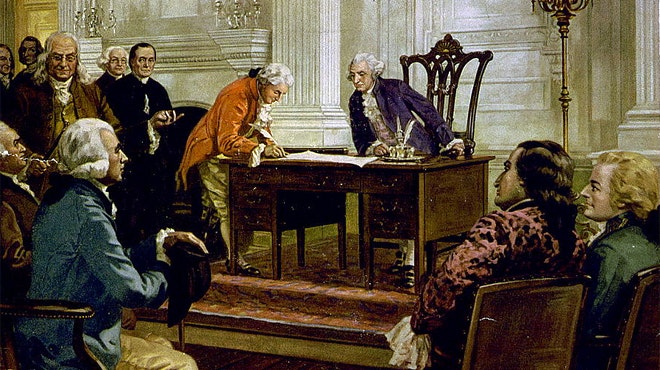A prophetic father of his country, President George Washington issued his Farewell Address as he approached the end of his second term in office on this day in history, Sept. 19, 1796.
He triumphantly celebrated the burgeoning young nation and his role in its creation, while soberly warning of the threat posed by regional and sectarian division.
“In looking forward to the moment which is intended to terminate the career of my public life, my feelings do not permit me to suspend the deep acknowledgment of that debt of gratitude which I owe to my beloved country for the many honors it has conferred upon me,” wrote Washington in an address that first appeared in the American Daily Advertiser, a newspaper in Philadelphia.
ON THIS DAY IN HISTORY, SEPTEMBER 18, 1870, OLD FAITHFUL GEYSER IS DOCUMENTED AND NAMED
Washington was the hero of the American Revolution — and his Abrahamic faith in the cause of independence inspired and held the nation together in the darkest hours of the rebellion.
But party divisions arose in the United States during his time in office. He warned in 1796 of their potential to shred the hard-fought unity of the previous 20 years.
“One of the expedients of party to acquire influence within particular districts is to misrepresent the opinions and aims of other districts,” Washington said in his address.
“They tend to render alien to each other those who ought to be bound together by fraternal affection.”
“The name of American … must always exalt the just pride of patriotism.” — George Washington
He added, “The alternate domination of one faction over another, sharpened by the spirit of revenge, natural to party dissension, which in different ages and countries has perpetrated the most horrid enormities, is itself a frightful despotism.”
ON THIS DAY IN HISTORY, SEPT. 6,1757, MARQUIS DE LAFAYETTE IS BORN, HERO OF TWO REVOLUTIONS
Washington issued his farewell statement after choosing not to run for a third term as president.
He proved the rare leader in history who willingly forfeited what might have been many more years of power.
His decision set the stage for the tradition of presidents to serve only two terms.
The two-term tradition was codified by the 22nd Amendment, ratified in 1951, six years after Franklin D. Roosevelt died in office while serving his fourth term as president.
ON THIS DAY IN HISTORY, AUGUST 22, 1776, THE BRITISH INVADE BROOKLYN BY SEA
Washington was so beloved in his era he was unanimously voted the nation’s first president by the electoral college in late 1788-early 1789.
John Adams was elected the first vice president.
Washington and Adams both easily won re-election in 1792.
But the vice presidential race of that second national election began to divide along party lines, setting the stage for Washington’s farewell warning.
Adams, of the Federalist Party, defeated Thomas Jefferson, of the Democratic-Republican Party, in Nov. 1796, two months after Washington’s farewell.
The father of his country invoked pride in his new nation, one unique in the history of mankind, as he left public life.
“The name of American, which belongs to you in your national capacity, must always exalt the just pride of patriotism more than any appellation derived from local discriminations,” he said.
“Washington’s Farewell Address spoke to contemporary concerns that the Union was weak and vulnerable to attacks from internal and external enemies,” writes the library of George Washington’s Mount Vernon.
“But even after the uncertainty of the early national period had passed, his message of unity remained powerful.”
Washington’s words, Mount Vernon also says, are “still recited annually in the United States Senate, a tradition dating back to the Civil War. The Farewell Address endures as a critical founding document for issues of Union, partisanship and isolationism.”
For more Lifestyle articles, visit www.foxnews/lifestyle
Read the full article here

